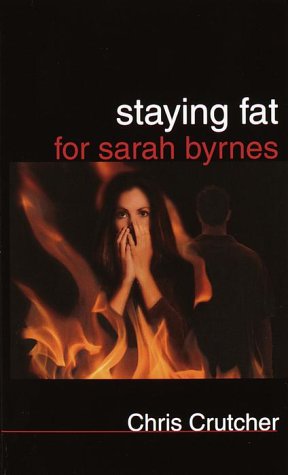This Teen Tuesday is for older teens. Staying Fat for Sarah Byrnes by Chris Crutcher was published in 1993. The characters are seniors in high school. There is language and older teen situations in the story: abuse, sex, mental illness, suicide attempt, abortion. The Lexile measure is 920L, which should make this a fairly quick read for the intended audience.
The story is a first person narrative told from Eric Calhoune's point of view. He is a swimmer and is large for an athlete. Kids call him Moby (as in the great white whale). He was fat all through school and is now beginning to get into better shape.
His best friend all through school is another outcast - Sarah Byrnes whose name fits with the fact that her face and hands were horribly burned when she was three years old. Her father refused to allow her to have reconstructive surgery, so she has had to create a tough interior to match her tough exterior.
As Sarah tries to deal with her abusive father, she stops speaking and is sent to a hospital. Eric is determined to help her. The blurb on the back of the book says, "The truth of Sarah Byrnes's horrific past finally catches up with her, and she stops speaking. It is Eric's mission to help her find a way through the pain. But uncovering the truth is a dangerous thing to do - when someone else doesn't want it uncovered."
I like that the adults in the book are not idiots (at least most of them). I love Eric's teacher and coach Mrs. Lemry. There is one good school administrator and one horrible one, but Crutcher writes the horrible one so that the reader can see why he is the way he is. Eric's mother is well written. Crutcher shows the dangers of trying to be perfect and expecting perfection from ourselves or others. He also shows how hard some decisions are and that sometimes there isn't one right answer to a problem.
This book will make you think about what you believe in new ways. It is a book about respect, loyalty, friendship, and doing what is right even when it is hard or costs you.
My only complaint is Crutcher using an allusion to one of his own books. When a writer refers to his own work or himself in the body of a story, it always throws me out of the story. If a reader loves a writer's work, they will read more of it. Allusions should be to other works that connect with your own. Crutcher does this as well, and does a good job of it, although I think some of the allusions in this book may be a bit dated at this point.
Overall this is a book worth reading.

No comments:
Post a Comment